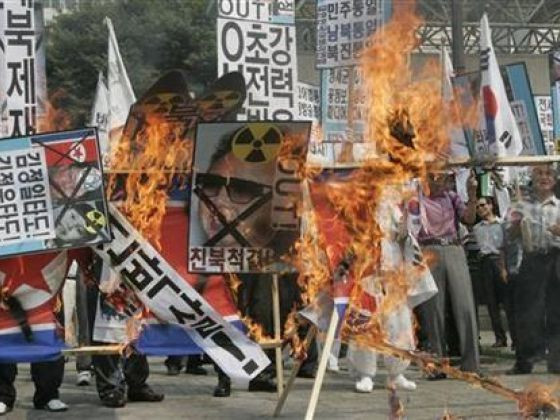Japan Court Rules Against Hate Speech, But Extreme Right-Wing Groups Sprouting Across Country

A district court in Japan has declared that "hate speech" against the country’s Korean minority is not protected by constitutional free speech statutes and can incur heavy financial penalties for those who commit such acts of verbal abuse. The Associated Press reported that a court in the city of Kyoto ordered an anti-Korean Japanese nationalist group called Zaitokukai to pay 12 million yen (about $124,000) to a Korean school after they disturbed classes by holding rallies and spewing insults at the students. According to reports, the members shouted such slogans as "kimchi [a traditional Korean dish] stinks," ''children of spies," "destroy Korean schools" and other threats.
Zaitokukai is an abbreviated form of “Zainichi Tokken o Yurusanai Shimin no Kai” which means “Citizens Against Special Privilege of Zainichi [Koreans in Japan].” The group claims nearly 14,000 hard-core members and a larger online community.
Judge Hitoshi Hashizume said the behavior of Zaitokukai, as well as the banners it carries and the videos it distributes over its website, are tantamount to racial discrimination as defined by U.N. conventions, which Japan ratified. “The actions are deemed intended to arouse a sense of discrimination among the public toward Korean residents in Japan,” he said. The court ruling also prohibited the group from conducting any more rallies and demonstrations in the neighborhood surrounding the elementary school in southern Kyoto that is operated by affiliates of the pro-North Korean General Association of Korean Residents in Japan.
Hate speech, strictly speaking, is not illegal in Japan. While nationalist rallies targeting ethnic minorities tend to attract limited numbers of supporters, they have been increasing in overall frequency over the past year, reflecting both worsening relations with Japan’s neighbors as well as an economic malaise that shows no signs of improving.
Anti-Korean demonstrations have also erupted in other Korean neighborhoods, including the Shin-Okubo district of Tokyo, where Zaitokukai members called Korean people "cockroaches," shouted "Kill Koreans" and even vowed to "throw them into the sea."
Shinichi Tokunaga, a lawyer for Zaitokukai, criticized the court’s ruling, citing that it breached the right to free political expression. “It is regrettable that our actions were not recognized,” Yasuhiro Yagi, deputy chairman of Zaitokukai, told reporters, according to Japan’s Asahi Shimbun newspaper. “While there may have been some inappropriate comments made [during the protests], most were legitimate. We cannot be convinced by the argument that the comments were discriminatory through the focus on less than 10 percent of the comments.”
Bigoted attitudes towards Koreans, Chinese and others can be traced to Japan’s imperial period, when the country’s military invaded and brutally occupied nations up and down East Asia and the Pacific. "Japanese society has been too insensitive to racial discrimination," said Yoshifu Arita, an opposition lawmaker who wants to introduce restrictions on hate speech. "We must take steps to eradicate hate speech against Korean and Chinese people, and address broader discrimination problems."
Chief Cabinet Secretary Yoshihide Suga said he was "concerned” about the prevalence of hate speech across the country, but it is not clear if the government will take specific steps to illegalize such behavior nationally.
According to the CIA/World Factbook, Koreans represent a minuscule 0.5 percent of the population, amounting to about 500,000 people. Still, they represent Japan’s biggest single ethnic minority and continue to face discrimination and prejudice with respect to housing, jobs and education. Many of the Koreans are descended from forced laborers imported to Japan during the 1910-1945 colonial period.
Groups like Zaitokukai now claim that Koreans are receiving “special privileges” through tax breaks and permanent residence and that they “abuse” Japan’s welfare system. Zaitokukai’s leader Makoto Sakurai, who was arrested in June for his part in a rally, told AP earlier this year: "Saying 'Let's kill Koreans' isn't illegal, so it's OK to say that. We've kept quiet for too long and we've had enough. Koreans hate us so much so we just tell them to go home. Call us racists if you want."
The recent election of conservative nationalist Prime Minister Shinzo Abe may also have encouraged the rise of ultra-right groups in Japan – although Abe has himself publicly criticized the behavior of such hate groups.
Yuriko Hara, chief of the Japanese branch of IMDAR, an international human rights group, said groups like Zaitokukai tend to attract working-class and low-income Japanese youths who are frustrated by the country’s slow economic decline.
But some Japanese are alarmed by the apparent rise of racism against Koreans and Chinese. Late last month, anti-racism protesters rallied in Tokyo’s Shinjuku Ward to raise awareness of a worsening social climate in the nation. “I was shocked to watch people smirking while saying ‘die’ to their targets,” said high school student Noe Nagashima, reported Asahi Shimbun. “Our generation must show an interest [on this issue] to change such a situation.” Yoshitaka Shiihara, 46, said he watched a video of a rally that featured hate speech and became upset, prompting him to participate in the rally. “I believe there are now more people who hate specific ethnic groups based on misleading information,” he said.
© Copyright IBTimes 2024. All rights reserved.





















